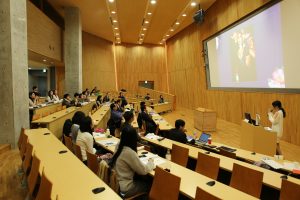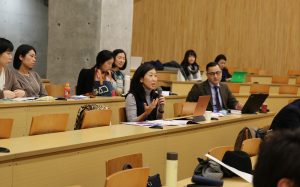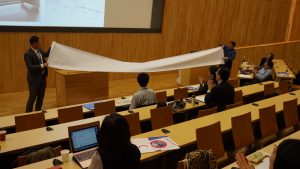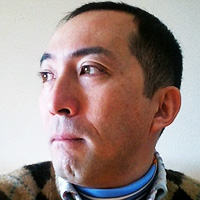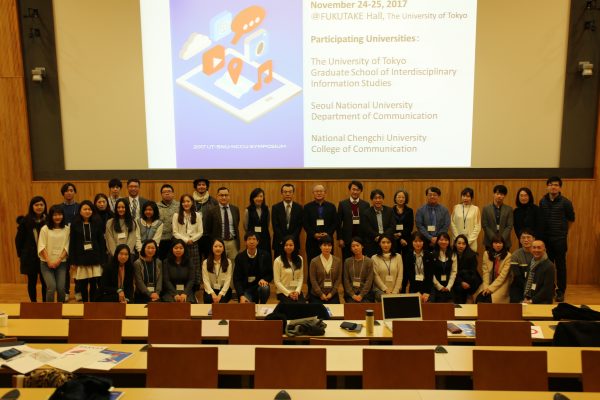
February 1, 2018
2017 日韓台 シンポジウム「Media in Globalized Asia」(前編)2017 UT-SNU-NCCU Symposium “Media in Globalized Asia” (Part1)
2017年11月24〜25日、日韓台シンポジウム「Media in Globalized Asia」が福武ホールにて開催されました。東京大学(以下、東大)とソウル国立大学(以下、ソウル大)の間で20年以上にわたり、毎年開催されてきたこのシンポジウムは、昨年から国立政治大学(以下、政治大)が加わり、日本、韓国、台湾の三カ国による交流を展開しています。この記事では、2日間のうち初日の24日について前編・後編に分けてレポートします。
Opening & Plenary Speech
オープニングスピーチでは、佐倉統学環長がゲスト参加者を歓迎し、続いて三大学から代表の先生方がお話をされました。ソウル大の姜明求先生は、このシンポジウムの由来を1980年代にまで辿り、当時の交流はまだ非公式かつ個人的であり、「アジア」という考え方も今日ほど明確ではなかったと議論されました。続く政治大の施琮仁先生は、新しいパートナーとして国立政治大学を受け入れてくれた東大とソウル大に感謝の気持ちを表しました。最後に東大の林香里先生は、自分自身の経験にも結びつけながら、20年以上におよぶこのシンポジウムの歴史が「グローバル化の過程」そのものであると述べました。
Faculty Session
その後、メディア論とコミュニケーション研究の分野から、三大学それぞれの教員による研究発表がおこなわれました。
政治大の陳百齡先生は、長さ数メートルにもなる台湾のある家系図を示し、家族や家系をめぐる歴史研究が、デジタル視覚化ツールによってネットワーク分析と結合する研究方法について発表されました。ソウル大のキム・ウンミ先生は、MIM(モバイル・インスタント・メッセンジャー)とSNS(ソーシャル・ネットワーキング・サイト)におけるニュース記事の共有行為の研究を紹介し、今日のような感情的であったり、ユーモアあるコンテンツが広がるメディア環境において、ニュース記事の共有行為は実は個々人のインターネットユーザーの自己呈示や自己の印象管理などの動機を反映していると指摘されました。
東大の額定其労先生は、長い間見過ごされてきた近世初期の司法記録を利用し、アジアにおける異なる法的文化の比較研究(「厳密組織型」(日本の江戸時代)、「安全指向型」(韓国)、「官僚型」(中国)、「権威型」(モンゴル))について発表されました。政治大の康庭瑜先生は、若い女性のSNSユーザーにおける自己の性的対象化に関して、「良いセクシーさ(文化資本のシンボルを有し、男性視線を参照しない)」と「悪い(下品な)セクシーさ」との境界を作る実践について発表されました。
最後の発表者であるソウル大のハン・キュソプ先生は、経済学者との共同研究を発表し、経済実験を通じて資本主義市場ルールのもとで北朝鮮難民の行為を検証し、北朝鮮の人々が市場経済のシナリオに適応することは非常にむずかしいことが明らかになったと報告されました。最後に、5人の教員発表に対して情報学環の佐倉統先生と前田幸男先生がコメントし、発表者とさらに議論をおこなったうえで午前のセッションがしめくくられました。
(後編に続く)
国立政治大学の記事も合わせてお読みください。
– Scholars from 3 Asian Top Communication Programs Met in Tokyo (中国語はこちら)
記事:林東佑(修士課程)、林意仁(博士課程)、デイビッド・ビュースト(特任専門員)
写真:堀越伶(修士課程)、鳥海希世子(特任助教)
校正:デイビッド・ビュースト、鳥海希世子、水越伸(教授)
The UT-SNU-NCCU Symposium “Media in Globalized Asia” was held at Fukutake Hall on November 24th and 25th, 2017. Originally held annually at the University of Tokyo (UT) and Seoul National University (SNU) for more than 20 years, the symposium is now exploring the potential of triangular interactions between Japan, Korea and Taiwan since National Chengchi University (NCCU) joined last year. This article is divided into two parts and reports the first day of the two-day symposium.
Opening & Plenary Speech
In the opening speech, Dean Sakura Osamu of III/GSII, UT welcomed the guest participants, followed by representatives from the three universities. Prof. Kang Myung-koo from SNU traced the pre-history of the symposium back to the 1980s, when the exchange activities were still unofficial and remained on the personal level, and the idea of “Asia” was not as clear as it is nowadays. Prof. Shih Tsungjen from NCCU then expressed his gratitude to the two universities for including NCCU in the symposium as a new partner. Finally, Prof. Hayashi from UT shared her personal memories of the symposium and described its over 20 years of history as being itself a “globalizing process”.
Faculty Session
The opening speeches were followed by presentations of faculty members from the three universities, introducing their respective research achievements in the field of media and communication studies.
Prof. Chen Pai-lin from NCCU presented a several-meter long pedigree relationship chart of Taiwanese local families, and showed us how a study of family histories can be combined with a network analysis approach using digital visual tools. Prof. Kim Eun-mee from SNU then presented her research on news sharing behavior on both MIM (mobile instant messenger) and SNS (social networking sites). She concludes that in today’s media environment, where emotional and humorous contents prevail, news sharing behavior actually reflects individual Internet user’s motivation for self-presentation and self-image management.
Prof. Khohchahar of UT presented his study of comparative legal cultures in Asia, using early modern judicial records, which had long been neglected, to examine the differences between the “Well-Organized Model” (Edo Japan), the “Safety-Oriented Model” (Korea), the “Bureaucratic Model” (China) and the “Authoritarian Model” (Mongolia). Prof. Kang from NCCU presented her research on young female SNS users’ self-sexualization, depicting their practice of boundary making between “good sex” (sexiness with symbols of cultural capital and with no reference to men’s gaze) and “bad (slutty) sex”.
The final presenter, Prof. Hahn Kyu-sup from SNU, presented his joint research with economists, using economic experiments to test North Korean refugees’ behavior under capitalist market rules, and concluded that it may be highly challenging for North Koreans to adapt in a market economy scenario. Finally, with regard to all the five faculty presentations, Prof. Sakura and Prof. Maeda of UT gave their comments and had further discussions with the presenters, thus concluding the morning sessions.
(To be continued Part2)
Please also see the article from NCCU.
– Scholars from 3 Asian Top Communication Programs Met in Tokyo (In Mandarin here)
Text: Lim Dongwoo (MA student), LIN Yi-Ren (PhD student), David Buist (Project senior specialist)
Photo: Rei Horikoshi (MA student), Kiyoko Toriumi (Project assistant professor)
Proofreading: David Buist, Kiyoko Toriumi, Shin Mizukoshi (Professor)
主担当教員Associated Faculty Members
教授
非公開: 水越 伸
Professor


